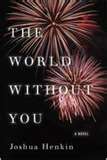 I read The World Without You and liked it very much. Maybe I’m dense, but I didn’t realize that the the journalist-son who died in Iraq was based on Daniel Pearl. So it was interesting to read this review by Adam Kirsch in Tablet.
I read The World Without You and liked it very much. Maybe I’m dense, but I didn’t realize that the the journalist-son who died in Iraq was based on Daniel Pearl. So it was interesting to read this review by Adam Kirsch in Tablet.
That said, The World Without you is a very good read. It’s thought provoking, emotionally gripping, beautifully written and filled with characters who are rendered so specifically and precisely that you feel like you just might know them. This engrossing novel is about parents, children, siblings and the disparate ways that people process grief and attempt to move on after loss.
Henkin is the author of the novels Matrimony, a New York Times Notable Book, and Swimming Across the Hudson, a Los Angeles Times Notable Book. He lives in Brooklyn, and directs the MFA program in Fiction Writing at Brooklyn College. Here is an excerpt from the review in Tablet:
There’s nothing like a novel set in the recent past to remind you of how quickly things change. In 2005, if a novelist had published a book that hinged on the murder of a Jewish American journalist by Islamic terrorists in Iraq, it would have been read as a political novel, a war novel, a post-9/11 novel—and, of course, a roman a clef about Daniel Pearl, who died in 2002 in Pakistan. Seven years later, Joshua Henkin has published just such a book in The World Without You, which is set in 2005 on the anniversary of the murder of Leo Frankel, whose story closely mirrors Pearl’s. The story takes place entirely on the Fourth of July weekend—an invitation to reflect on the state of the nation if ever there was one.
Yet the passage of time has made it possible for Henkin to turn this headline-news premise into a book that is quiet, inward-turning, and largely apolitical. Leo Frankel’s death is alluded to but never actually described; the particular reasons for his murder matter less than the void it has left in the lives of his family: That void, not Iraq or terrorism or anti-Semitism, is Henkin’s real subject. It has brought Leo’s parents, the long and happily married David and Marilyn, to the brink of divorce; it has deepened the divisions among his three sisters, Clarissa, Lily, and Noelle; and it has left his widow, Thisbe, with the terrifying freedom to start a new life.
The World Without You follows these characters as they gather in the Frankels’ summer house in Lenox, Mass., for the unveiling of Leo’s grave. Henkin proceeds by means of dialogues and meditations, with hardly a set-piece or dramatic eruption to be found. Even the memorial service, which promises to be the climax of the weekend and the novel, and around which so many emotions are swirling, is spared the fate of becoming a denouement or a symbol. Instead, it is just another one of the evenly narrated events of the weekend, where nothing especially dramatic happens. Instead, there is the typical small change of a summer weekend in the Berkshires: a bicycle ride, a swim in the lake, a drive into town, a game of tennis.
